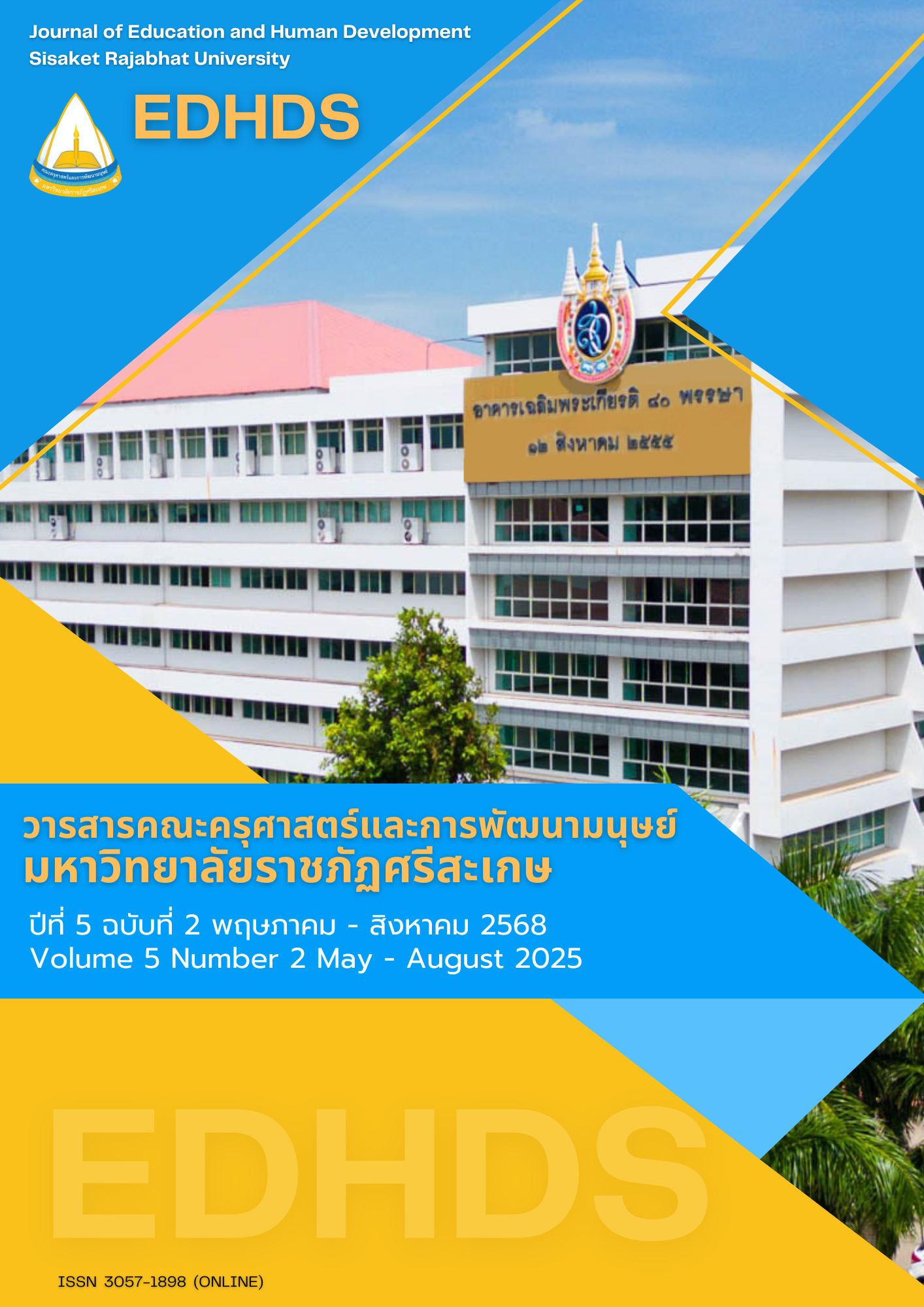Guidance Grounded in Earners' Essential Needs: Translating Research into Learner-Centered Practice
Keywords:
Essential needs of learners, Guidance, Inner voiceAbstract
The essential needs of learners in the Thai education system remain largely unaddressed, particularly regarding emotional regulation, receiving understanding from teachers, and respect for dignity. This article analyzes these "essential needs" as reflected in 2025 research findings from the Office of the Education Council Secretary, interpreting them as "inner voices" concealed beneath silence and challenges in self-expression. The study employs an integrative document analysis approach, drawing upon psychological and guidance theories including Self-Determination Theory, Positive Youth Development, Trauma-Informed Care, and Planned Happenstance Theory. The analysis proposes a "Voice-to-Action Framework" that decodes learners' deep-seated needs into three levels: surface, interpretative, and inner voice. It further offers responsive guidance approaches at group activity, individual counseling, and systemic levels to foster sustainable and meaningful growth.
References
กรมสุขภาพจิต. (2568). รายงานประจำปีกรมสุขภาพจิต ประจำปีงบประมาณ พ.ศ. 2567. กระทรวงสาธารณสุข.
สำนักงานเลขาธิการสภาการศึกษา. (2568). รายงานผลการวิจัยระดับชาติว่าด้วยคุณภาพชีวิตและความต้องการของผู้เรียน. สำนักงานเลขาธิการสภาการศึกษา.
Archambault, I., Janosz, M., Fallu, J.-S., & Pagani, L. S. (2009). Adolescent school dropout: A review of psychological and educational predictors. Educational Psychology Review, 21(2), 131–145. https://doi.org/10.1007/s10648-008-9090-0
Bronfenbrenner, U. (1979). The ecology of human development: Experiments by nature and design. Harvard University Press.
Chung, J. H. J. (2021). “We participate, silently”: Thai university students’ perceptions of classroom participation. Qualitative Research in Education, 10(1), 62–87. https://doi.org/10.17583/qre.2021.6018
Krumboltz, J. D. (2009). The happenstance learning theory. Journal of Career Assessment, 17(2), 135–154. https://doi.org/10.1177/1069072708328861
Lerner, R. M., Almerigi, J. B., Theokas, C., & Lerner, J. V. (2005). Positive youth development: A view of the issues. The Journal of Early Adolescence, 25(1), 10–16. https://doi.org/10.1177/0272431604273211
National Child Traumatic Stress Network. (2017). Creating, supporting, and sustaining trauma-informed schools: A systems framework. https://www.nctsn.org/resources/creating-supporting-and-sustaining-trauma-informed-schools-systems-framework
Przybylski, A. K., Murayama, K., Roecklein, C. M., & Ryan, R. M. (2013). Motivational, emotional, and behavioral correlates of fear of missing out. Motivation and Emotion, 37(2), 181–188. https://doi.org/10.1007/s11031-013-9313-2
Robinson, K., & Aronica, L. (2015). Creative schools: The grassroots revolution that's transforming education. Viking.
Rogers, C. R. (1961). On becoming a person: A therapist's view of psychotherapy. Houghton Mifflin.
Ryan, R. M., & Deci, E. L. (2017). Self-determination theory: Basic psychological needs in motivation, development, and wellness. Guilford Press.
Sugai, G., & Horner, R. H. (2009). Responsiveness-to-intervention and school-wide positive behavior supports: Integration of multi-tiered system approaches. Exceptionality, 17(4), 223–237. https://doi.org/10.1080/09362830903235375
Twenge, J. M. (2017). iGen: Why today's super-connected kids are growing up less rebellious, more tolerant, less happy and completely unprepared for adulthood and what that means for the rest of us. Atria Books.
Valkenburg, P. M., & Peter, J. (2017). Social media and adolescents' well-being: Developing a process model of various risk and opportunity effects. Journal of Youth and Adolescence, 46(5), 920–938. https://doi.org/10.1007/s10964-017-0649-z
Downloads
Published
How to Cite
Issue
Section
License
Copyright (c) 2025 Faculty of Education and Human Development, Si Saket Rajabhat University

This work is licensed under a Creative Commons Attribution-NonCommercial-NoDerivatives 4.0 International License.
บทความที่ได้รับการตีพิมพ์เป็นลิขสิทธิ์ของคณะครุศาสตร์และการพัฒนามนุษย์ มหาวิทยาลัยราชภัฏศรีสะเกษ
ข้อความที่ปรากฏในบทความแต่ละเรื่องในวารสารวิชาการเล่มนี้เป็นความคิดเห็นส่วนตัวของผู้เขียนแต่ละท่านไม่เกี่ยวข้องกับมหาวิทยาลัยราชภัฏศรีสะเกษ และคณาจารย์ท่านอื่นๆในมหาวิทยาลัยฯ แต่อย่างใด ความรับผิดชอบองค์ประกอบทั้งหมดของบทความแต่ละเรื่องเป็นของผู้เขียนแต่ละท่าน หากมีความผิดพลาดใดๆ ผู้เขียนแต่ละท่านจะรับผิดชอบบทความของตนเอง



